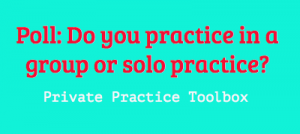Talk to thousands about your practice by submitting content for Private Practice Toolbox.
I've written a lot about the importance of content creation in building a professional online presence, creating value for website visitors and social media followers, and establishing yourself as an expert in your specialty area.
Incoming links to your practice website boost SEO, boost traffic, and establish credibility. It's always better to create content for larger websites. Well, here's your chance to shine. I want to feature you on THIS blog in 2013! Here are 4 ways you can be featured:
1) Pitch a guest blog
I'm always looking for guest posts from qualified individuals from a variety of fields who can share insights about how to run, manage, market, and thrive in private practice. I recently started working on my PhD and I'm not able to blog as often as I used to. I'm open to posts from professionals outside the mental health field as well. Attorneys, accountants, SEO experts, marketing, website design, interior design...If your expertise can help private mental health practitioners build successful businesses, pitch away!
2) Be featured in my"Adventures in Private Practice" series
Answer the following questions and submit them with a photo, a brief summary of your practice and a link to your website here.
- Tell me a little about your practice…
- Why did you decide to open a private practice?
- Clients that therapists find to be the most “difficult” are sometimes the ones who can teach them the most. What have you learned from your toughest clients?
- What’s your biggest pet peeve about private practice?
- How did you discover or develop your practice “niche”?
- What resource (book, website, person) helped you the most when setting up your private practice?
- What has surprised you most about being in private practice?
- Has your private practice helped you grow professionally? How so…
- Has it helped you grow personally, too? How so…
- Being a therapist can be emotionally exhausting. What do you do to care for your own emotional and psychological health?
- How do you cope with the inevitable stressors involved with being your own boss?
- What personal strengths have helped you succeed in private practice?
3) Be Featured in a "A Day In The Life" Series
How do private practitioners spend their time? What does it take to create a thriving practice? Track your private practice activities for one day. Submit a word doc, photo, practice summary, and link to your practice here.
4) Be feature in my "Virtual Office Tour" series
Submit a video tour of your office space and I'll feature it on this blog! Submit you information here. Peek inside other therapist's offices.
Other ways to connect with private practice resources:
Join the Private Practice Toolbox Facebook Group
Join the Twitter conversation using hashtag #practicetoolbox (I'm @julie_hanks)
Join the 2013 Therapist Blog Challenge for help creating regular content on your private practice website.





 Are you unsure about how much to charge for psychotherapy in private practice? I've blogged recently about
Are you unsure about how much to charge for psychotherapy in private practice? I've blogged recently about 
As healers, we genuinely like to do our work. Guiding clients through the therapy process and seeing them make progress is why we do what we do. But if you're in private practice, you know there's a lot going on in the back end and that it's crucial to run an efficient and organized business.